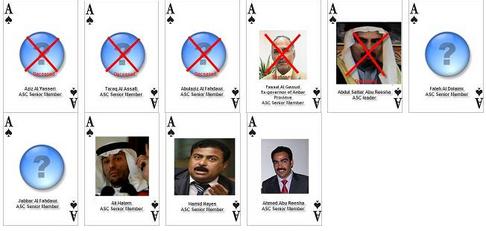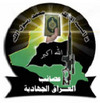With the onset of Ramadan, the Muslim religious holiday of fasting and prayer, al Qaeda and the Sunni insurgents have historically increased the number of attacks against Coalition and Iraqi Security Forces. The number of attacks and casualties have traditionally spiked during this time frame as al Qaeda has promoted the notion that “martyrs” killed during the holy month will receive special consideration in paradise upon committing their murders. But since the beginning of Ramadan on September 13, attacks and deaths in Iraq have plummeted.
As of September 30, attacks throughout Iraq have dropped by 38 percent, Brigadier General Mark Gurganus, the ground combat commander in Anbar province reported. In Anbar province, the attacks declined from 415 during one week in 2006 to roughly 90 during the same period this year.
Al Qaeda in Iraq has been largely unable to conduct mass casualty suicide attacks inside Baghdad, and large-scale attacks in the provinces have been rare. The most significant strikes occurred in Diyala and Anbar provinces. But both attacks were related to al Qaeda’s modified Ramadan offensive: a campaign of assassinations targeting tribal leaders organizing their resources to fight al Qaeda in Iraq.
Al Qaeda in Iraq announced its strategy at the beginning of Ramadan, after the assassination of Sheikh Abdul Sattar Abu Risha in a car bomb attack just outside of his home in Ramadi on the opening day of Ramadan. Sattar was the founder of the Anbar Awakening movement and organized the Anbar tribes to oppose al Qaeda in Iraq in the province that was once the bastion of the Sunni insurgency. Al Qaeda in Iraq immediately took credit for the murder, calling it a “heroic operation.”
Al Qaeda announced its assassination campaign through the Islamic State of Iraq, its puppet political front organization, in two Internet postings. Al Qaeda formed “special security committees” with the purpose to “assassinate the tribal figures, the traitors, who stained the reputations of the real tribes by submitting to the soldiers of the Crusade,” The Associated Press reported. “We will publish lists of names of the tribal figures to scandalize them in front of our blessed tribes.”
In an Internet posting titled “Pictures of the Infidels and Apostates Wanted by the Islamic State of Iraq,” al Qaeda taunted the Anbar awakening and warned other tribal leaders they would not live to see the end of Ramadan. Al Qaeda posted images and names of tribal leaders, with faces of those murdered crossed out.
“We killed your leader and sheikh on the first day of Ramadan, as we promised you,” al Qaeda wrote, the translation provided by the Middle East Research Institute, or MEMRI. “You should know that the ISI will prevent most of your [other] leaders from offering up their holiday prayers [on ‘Id Al-Fitr at the end of the month of Ramadan]. You will never see ‘Id Al-Fitr, because [the jihad fighters] have turned [this] Ramadan into a grave for the apostates. [Abu Risha] is the first … dead hypocrite of this month – [the month of] jihad and mujahideen – and will be followed by many others.”
Since the announcement of this assassination campaign, al Qaeda has conducted several high-profile tribal assassinations. The two most dramatic attacks included the assassination of the leader of the Salahadin Awakening Council and an attack on a joint Shia-Sunni tribal meeting in Diyala province.
On October 4, al Qaeda attacked the convoy of Sheikh Muawiya Jebara, a senior member of the Salahadin Awakening Council, as he traveled near the provincial capital of Samarra. Jebara and three bodyguards were killed in the attack. The Salahadin Awakening formed in late May, and al Qaeda in Iraq immediately began to target the group.
On September 24, an al Qaeda in Iraq suicide bomber struck at a tribal engagement held in a mosque in Shifta, a village near Baqubah. Over 800 tribal leaders and community representatives gathered for the reconciliation dinner. At least 26 were killed and 50 wounded. “Among the dead was the head of a Shiite delegation, Sheikh Ahmed al-Tamimi, and Ali Daleen al-Jourani, a local police chief,” Bloomberg reported. The governor of Diyala province was also wounded.
Al Qaeda also conducted several lower-profile attacks against tribal in September, including a strike against two villages near the city of Muqdadiyah in Diyala province on September 16. Fourteen civilians were killed and 12 shops were burned to the ground. The villagers were “members of a tribe which has aligned against al Qaeda and joined Diyala Awakening Council to fight them,” a military intelligence source told The Long War Journal.
Insurgent groups continue to turn
Despite al Qaeda in Iraq’s attempts to intimidate tribal leaders, the Awakening and other movements have yet to fold and are continuing to organize against the terror group. As al Qaeda in Iraq attempts to dominate the Sunni insurgency, these insurgent groups also continue to turn on the terror group. The latest group to denounce al Qaeda in Iraq is Asaeb al Iraq al Jihadiya, or the Iraqi Jihad Union, which has espoused an affinity toward al Qaeda in Iraq in the past.
Evan Kohlmann reported on the Iraqi Jihad Union’s turn against al Qaeda. The Iraqi Jihad Union issued a statement on the Internet denouncing al Qaeda for its excesses against the Sunni people. The insurgent group accused “al Qaeda’s ‘Islamic State of Iraq’ of deliberately killing [Iraqi Jihad Union] fighters in Diyala province and mutilating their bodies,” Kohlmann noted. “To make things worse, [the ISI] dug up their bodies from the graves, further mutilated them, beheaded them, and showed them off from their vehicles while driving through the towns,” the statement said. “[The ISI] even killed our men’s wives and children.”
The Iraqi Jihad Union “claimed at least seven joint operations in conjunction with fighters from Al-Qaida’s ‘Islamic State of Iraq’ between April and July 2007.” In the recent past the Iraqi Jihad Union scolded the Islamic Army of Iraq for forming the now-defunct Reformation and Jihad Front and asked the IAI “to apologize to our brothers from the Islamic State of Iraq.”
Just two days ago, Kohlmann reported on the turn of Iraqi Hamas, a splinter group of the 1920s Revolution Brigade. Iraqi Hamas accused al Qaeda of similar atrocities.
“Every day they witnessed heads or headless bodies lying in their streets. Each one of these victims had been accused of a so-called ‘crime’ prohibited by al Qaeda fatwahs … then [Al-Qaida] attacked Ameriyyat [al-Fallujah] with a car bomb packed with chlorine gas canisters, and they even laid siege to the area to prevent food and fuel from getting to people. Finally, they killed several men at the local market and smashed their heads against boxes of food. … We [have] witnessed dozens of beheaded bodies and none of them were Americans. Rather, they were all local people from the area-people who, at one point, had supported the Al-Qaida network until they themselves had become disposable.” In fact, according to Hamas in Iraq–as a result of the various crimes al Qaida has committed against innocent Muslim civilians–“the al Qaeda network has actually made people here think that the occupation forces are merciful and humane by comparison.”
The next day, Izzat Ibrahim al Douri, the most wanted Baathist and leader in the Sunni insurgency, formed a new insurgent front that stated it is willing to negotiate with the US. Al Douri had pledged bayat – an oath of allegiance – to Abu Musab al Zarqawi, al Qaeda in Iraq’s former commander, in early 2004, but denounced al Qaeda last summer.
 Please support The Long War Journal by donating to Public Multimedia Inc., our nonprofit media organization and publisher of The Long War Journal. All donations are 100 percent tax-deductible, and all donations will be used to support The Long War Journal.
Please support The Long War Journal by donating to Public Multimedia Inc., our nonprofit media organization and publisher of The Long War Journal. All donations are 100 percent tax-deductible, and all donations will be used to support The Long War Journal.










1 Comment
Middle East News- 10/06/07
The September Israeli airstrike on a suspected nuclear site in Syria had been in the works for months, ABC News has learned, and was delayed only at the strong urging of the United States.